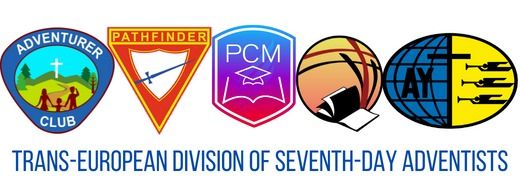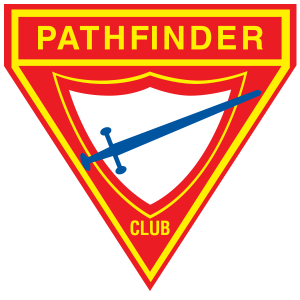The Pathfinder uniform helps make the Pathfinder programme real and visible. It is emblematic and representative of the worldwide club’s ideals and standards. Each individual member becomes a very vital representative of the organisation, and wearing the uniform will help to provide a consciousness of belonging to a club that rightly represents the Adventist youth of today. If the uniform is worn as ordinary clothing it will have failed in its purpose.
The uniform should always be neat and clean. To wear it commonly for ordinary play or work lowers its dignity. The Pathfinder Club programme should be so valuable to each member that the uniform will be acquired and worn with enthusiasm.
When the Uniform Should Be Worn
- At all Pathfinder meetings
- At any public gathering when any or all act as: Messengers, Ushers, Guard of honour, Colour Guards
- On occasions as specified by Pathfinder director
- At special Pathfinder services
- While engaging in witness activity, or community service such as Ingathering, distributing food baskets, flowers, literature, etc.
When the Uniform Should Not be Worn
- By non-members
- When engaged in selling or solicitation for personal profit, or for commercial or political purposes
- At any time or place when it’s wearing discounts the organisation or casts reflection upon the uniform, lowers its dignity and esteem, and makes it commonplace.
Other Basic Uniform Guidelines
- The official uniform for the Adventurer, Pathfinders, Master-Guide, and Ambassador is stipulated by the General Conference of Seventh-day Adventist® Youth Ministries Department. Any deviation or changes, including, but not limited to, the uniform’s style and colour, must first be authorised by the General Conference of Seventh-day Adventist® Youth Ministries Department.
- Should include the Pathfinder world emblem and the Pathfinder scarf. Other insignia and styles of uniforms are determined by each Division in keeping with the norms and economic conditions of the fields under their care.
- While the uniform of the Pathfinder Club varies in regions or even countries around the world, the insignia and where they are placed are well nigh universally the same. Designing and setting the position of the insignia and/or working any changes or additions is the responsibility of the World Pathfinder Director and the General Conference in consultation with the divisions. Clubs, conferences, unions and divisions may make no exceptions or variations without the definite permission from the World Pathfinder Headquarters
Uniform Insignia
While the uniform of the Pathfinder Club varies in regions or even countries around the world, the insignia and where they are placed are well nigh universally the same. Designing and setting the position of the insignia and/or working any changes or additions is the responsibility of the World Pathfinder Director and the General Conference in consultation with the divisions. Clubs, conferences, unions and divisions may make no exceptions or variations without the definite permission from the World Pathfinder Headquarters.
The insignia are divided into two categories:
1. Identification Insignia are the group of emblems that signify the organisation to which the person belongs.
2. Recognition/award Insignia are emblems indicating class achievement, position, or special achievements in conduct or service.
DESCRIPTION AND POSITION OF OFFICIAL PATHFINDER CLUB IDENTIFICATION INSIGNIA :
This is the symbol that represents the Pathfinder Club. The 2-inch (5-cm.) triangle is worn on the cap, beret, etc. The Pathfinder Club emblem 3-inch triangle (7.5-cm.) in the local language is worn on the right-hand sleeve, shoulder high.
These are worn on the right sleeve of the shirt/blouse, and dress uniform jacket ½-inch (1.2 cm.) below the shoulder seam. It is worn above the staff name strip and Pathfinder triangle on the right-hand sleeve.
Area/district director/coordinator, club director, deputy director, instructor, counsellor, and junior counsellor may wear a strip designating their position; it is centred below the club name 2-inch (5 cm.) below the shoulder seam and ¼-inch (.08-cm.) above the Pathfinder triangle on the right-hand sleeve.
This oval symbol, containing the Pathfinder triangle, represents the worldwide organisation of Pathfinder Clubs of the Seventh-day Adventist Church. This symbol is worn on the left-hand sleeve of shirt/blouse, and dress uniform jacket. It is positioned ½-inch (1.2-cm.) below the shoulder seam.
This is yellow in colour with the World Pathfinder emblem as the logo on the back. An optional slide is available. This may be worn by all inducted Pathfinders and Non-Master Guide Staff.
This is yellow in colour with the Master Guide Crest printed on the tip of the triangle. The distinctive Master Guide slide with the Master Guide Crest is used with the neckerchief. It is to be worn only by those invested as Master Guides.
The following are a description of Pathfinder recognition insignia: Are located on the left sleeve below the Pathfinder world emblem. The order from top to bottom is Master Guide, Guide, Voyager, Ranger, Explorer, Companion, and Friend. All persons (Master Guide Included) should wear only the class insignia in which they have been invested.
An embroidered gold star is worn on left-hand sleeve. When all Pathfinder classes and the Master Guide course have been completed, the Master Guide Star and all the individual chevrons may be worn.
Upon Investiture for each class, the Pathfinder obtains a pin of recognition to be worn on the uniform: These may be worn centred across the top of the left pocket. The Master Guide pin would be placed in the centre at the top of the left pocket with pins of other classes in which the Master Guide has been invested centred in a row below, or the Master Guide may choose to wear only the Master Guide pin. When advanced level insignia have been earned, the class pins may be placed on the sash.
Centred just above the left pocket of the shirt/blouse is the Pathfinder Class pocket strip for the highest Pathfinder Class in which the individual has been invested. It should be level with the top of the uniform shirt pocket.
This is worn only by those completing the requirements, on the left side of shirt or dress just above the Pathfinder Class pocket strip.
This is worn on the left side of shirt, blouse, or dress above the pocket. It is usually above the Pathfinder Class pocket strip or Advanced Pathfinder Class Ribbons.
To be worn by captain and scribe on the sash, or positioned above the right pocket, on the shirt/blouse.
This is worn over the right shoulder (under neckerchief) and under the left arm, the lower point of the sash resting against the left side of the body. It serves as a collecting point for Honour patches and all other Pathfinder related emblems the wearer has earned. (Traded items are not to be included here.)
These are obtained from the conference/mission director. There are two options: 1) Embroidered fabric stars may be worn on the right sleeve centred ¼-inch (0.08-cm.) below the point of the 3-inch (7.5-cm.) Pathfinder triangle emblem. 2) Metal stars may be worn on the left pocket. Only one star with the numeral indicating the accumulated years of verifiable service should be worn. Service stars are awarded annually by the conference/mission that keeps a record of the years of service. Epaulettes, Stripes, Stars of Rank.
An optional green epaulette is worn by teen Pathfinders, junior counsellors, counsellors and instructors. Optional gold stripes, bars, stars or various coloured braids are worn for each level of conference leadership. These items are selected by local conferences, unions, or Divisions. Not more than one option may be worn and must be standard within the organisation level selecting in.
The use of a uniform in Pathfindering provides many positive results. It meets certain psychological needs of the Pathfinder age bracket; it encourages what could be called upgraded behaviour; and it provides a sense of cohesiveness.
In most regions the official uniform adopted in many ways resembles local military uniforms as local laws will or will not allow. While this is acceptable to a degree, those who have the decision making authority must be very careful to not create nor allow militarism to creep into Pathfindering. Militarism is defined as the use of military discipline and the wholesale adoption of military-style uniforms that would create confusion in the minds of those who do not know what Pathfindering represents. Around the world there are governments that are very sensitive to the existence of paramilitary organisations. Pathfindering in other parts of the world cannot be seen by these governments as involved in training guerrilla or terrorist-type personnel. Camouflage, combat boots, “blousing” of pant legs, and other similar military practices in uniforms should not be used at all. No military insignia are allowed. The Pathfinder scarf should always be worn as part of the dress (Class A) uniform to distance it from the traditional military uniform. Attaching weapons to dress uniforms such as swords, bayonets, or machetes and guns even if they are fake ones should not be allowed even in drill ceremonies.

